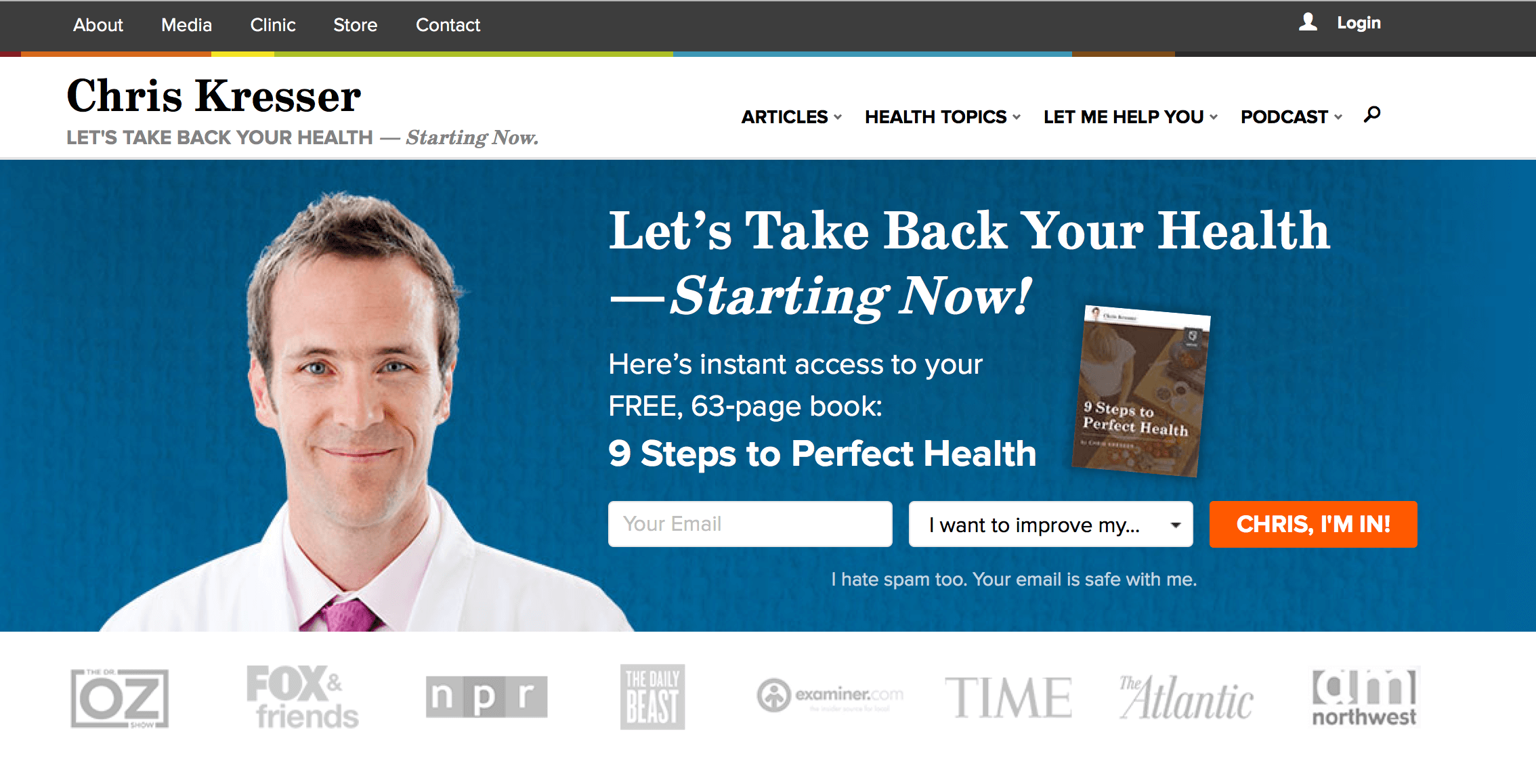Do you ever wonder if you’ve chosen the right niche? Or, are you struggling with even finding your niche in the first place? Choosing a niche is probably the single most common struggle for both my clients and students over the years.
Take the following conversation, for example. I’ve had one very much like this with practitioners hundreds of times over the past 15 years:
“Keith, I’ve decided that my topic niche is (the gut/thyroid/women and hormones). This is what I know the most about, the research I’m most excited about sharing, and represents the most success I’ve had with my patients.”
And then, this:
“But there’s Doctor X, and he/she already writes with a lot of authority on (the gut/thyroid/women and hormones). Is there room for me?”
What about Doctor X? Is there room for more than one authority in a topic niche? After all, the Internet is flooded with every possible expert variation on every conceivable health topic. Is there room for your voice, for your experience and unique skill set?
What if your niche topic has been claimed by an amateur: someone who isn’t a doctor, but instead a patient who healed him or herself with a protocol cobbled together from reading blogs? And what if this amateur now draws some prime search real estate in Google? Can you compete with that?
I’m here to tell you that no matter who you are, and no matter what your topic, you can come to own a niche of your own. Let’s reverse-engineer some of the biggest doctor niches online today, and see how they established themselves as superstars and claimed their massive audiences.
There’s More to Niche Than Topic Alone
So let’s say there’s already someone else covering your precise niche topic. There are a few more questions to consider:
— What if Doctor X doesn’t speak to everyone? (No one – no matter how magnetic they are — speaks to everyone.)
— What if some people think Doctor X is a jerk, or writes over their head?
— What if while searching for your topic expertise, a Google searcher finds your website — your articles on your authoritative topic, they read you and discover they resonate with your voice? I maintain there is an audience out there waiting for your voice and your message. So let’s explore three ways to choose and claim your niche with confidence.
Three Ways to Approach Creating Your Niche
There are three different ways the health practitioner can niche him or herself, and I’ve used all of these with clients with great success. They are:
— The Single-Topic Niche
— The Point of View Niche
— The Methodology Niche
Let’s explore each one of these and see which is right for you.
1. The Single-Topic Niche
I love the way Dr. Izabella Wentz has claimed a single, focused niche and has made it her own: she is The Thyroid Pharmacist. What’s more, she maintains that laser-focus everywhere online, which is critical when claiming and establishing your expertise and authority: She remains The Thyroid Pharmacist on both her primary platform and in social media. This kind of focus is the way you confidently claim and come to own a niche. Izabella is a master class in niching.
Some niches aren’t always so obvious. Dr. Mark Hyman’s initial niche is a good example of this approach, but you wouldn’t know that looking at him today! At first, some would say he was laser-focused on a single topic, The Blood Sugar Solution. He didn’t have just ANY blood sugar solution, or so claimed his publishers. He had THE solution. And, that tightly focused niche (and bestselling book) helped him build an audience and then an empire, and now that he’s reached that rarified “Celebrity” stage, he long ago branched out far beyond talking about just blood sugar alone.
Is the Single-Topic Niche Right for You?
I only recommend choosing a Single-Topic niche if you can claim some unique level of expertise or clinical experience in that topic, very much like Izabella Wentz is doing with her work, or Mark Hyman did with his clinical work.
I’d also recommend the Single-Topic approach for you if your clinical work with clients or your research points to a clear choice, especially if that topic connects with to a narrow audience with a very specific need. If you have proven expertise solving that precise problem, then by all means, jump on that single topic and run with it until you come to own it.
Many healers you don’t have such narrowly focused expertise. Most of you probably offer a range of solutions as a result of whatever your patients or clients have needed up until this point. So if the single-topic approach doesn’t feel like a great fit for you, consider mixing and matching these additional methods.
2. The Point-of-View Niche
Fans of Chris Kresser may remember his first niche was ”The Healthy Skeptic,” in fact, that was the name of his website at the time. When Chris first started writing, he thought a lot about how he approached his work and his writing and decided what set him apart was not one problem or topic, but rather his skeptical take on conventional health wisdom. That initial niche served him very well as a starting place to begin writing to, talking with, and building his audience.
One of the things Chris wrote about — with well-researched and even-handed skepticism — was the Paleo diet well before it became the trendy topic it is now. As his reputation grew, Chris was encouraged to embrace the trailblazing clinical work he was doing with his patients, and his new growth niche became the world’s number one “Clinical Paleo Practitioner.”
Another way some look at POV is through personality: If you have a strong personality, one that comes across quickly in your writing or on video or audio, this may be the way to go for you. There are so many bloggers we can name who are famous purely because of their attitude. That said, you’ve got to have something to say, especially in the health space. That sassy personality will only take you so far if you’re not also helping people solve their problems.
Is the POV Niche Right for You?
I recommend choosing the POV niche only if you can identify something about your personality or your voice that is uniquely you, and differentiates you from others in your field. Look for a thematic element that runs through your work – especially if it allows you to write with passion and in surprising or controversial ways. People want to read someone who takes a strong, clear, knowledgeable stand for something while fighting the good fight against a common enemy.
So, what passion drives you? What do you oppose? Is there a ‘lens’ through which you approach all your work?
For example, maybe you are passionate about taking personal responsibility for health. Or you’ve worked psychology into your approach to healing and treatment plans. Perhaps you are passionate about enabling low-income folks to heal their chronic issues with low-cost options. Or maybe you take a stand on starting with kids and education as a primary tool for preventing chronic illness?
As long as you can support your point of view with research or with real-world, hands-on patient/client experience, this is the kind of content that earns and deserves attention online.
How about running with your personality alone as a niche? If you do, you’d better have one powerfully magnetic persona. Personally, I don’t think persona works well long term for health practitioners, unless you’re in a field like fitness or beauty. Even then, you’ve got to back up that persona with content, or you become just one more voice in the crowd.
3. The Methodology Niche
A perfect example of this is the one-man juggernaut known as the Bulletproof Executive, Dave Asprey. His initial niche was tightly focused on “bio-hacking” as a method for improving health and wellness. He narrowed this even further by focusing on executives, because that is a crowd he knew well, and related to. He called his site “The Bulletproof Executive.” And with fame, success, and massive audience growth, more people decided they wanted to learn about this bio-hacking methodology, so he just became “Bulletproof” with his “Bulletproof Coffee” phenomenon. The Bulletproof story is a perfect case study illustrating how powerful a tight niche can be in the beginning. Niching narrowly always serves to attract your first, most important bedrock audience, faster. And once you have that audience, you can then begin to branch out.
Another great example of a Methodology Niche is Dr. Peter D’Adamo and his wildly popular “Blood Type Diet” protocols. After coming to name and own that niche, Dr. D’Adamo has long ago expanded his niche-topic ownership from blood type to a broader “personalized nutrition” niche that includes his pioneering work in the field of epigenetics and genotype.
Is the Methodology Niche right for you?
I recommend the Methodology Niche if there’s a healing modality or approach in which you have expertise and passion. This niche works especially well if you’ve created a unique healing model all your own.
Maybe you’re uniquely qualified to call yourself the “Ayurvedic Practitioner for Pain Relief.” Or perhaps your preferred method is supplementation and all the ways that health improves with supplementary nutrition. Or, maybe your method has more to do with living enzymes or avoiding EMF pollution and other environmental factors.
Is there some unique, highly specific technique or protocol you’ve studied that you’ve used with great success in your work with patients or clients? Have you in any way made this your own? If so, maybe this approach is a great way for you to niche yourself in the marketplace of ideas.
Don’t Yet Have Your Niche? Write Anyway.
If you’re still struggling with your niche, please just start writing. Of course, if at all possible, I encourage all of my clients to focus on a narrow niche, at first. But the best niche in the world won’t do you any good if not having chosen “the perfect niche” is preventing you from generating new content for your website.
Sometimes the best path to finding your ideal niche is through the process of just getting started with a ‘for now’ niche and writing with enthusiasm about what you know. It is more important begin communicating with an audience.
Choose a niche, any niche, to get you started writing more focused content. Because no matter how unique you think your niche may be now, chances are good you’ll be changing or at least tweaking your choice 12-18 months later. And, that’s okay! In fact, almost every one of the superstars I profile in this article has changed their niche at least once in their online careers.
Even if you haven’t yet discovered a niche you can own, or want to write about too many things, and you can’t narrow it down to one topic or audience, I urge every practitioner I meet just to begin writing. Writing is the only way to discover what people respond to and helps you become a better communicator.
What’s more, when your niche eventually does becomes focused, and you click into that groove, much of the content you’ve generated can be moved and reordered on your new site. All of my most successful clients have moved their content at least twice over the years — as they move naturally from a Phase One doctor platform to a Phase Three web platform.
Yes: My most successful clients have benefited immensely from the tightly-focused niche I help them select. But, those who saw the fastest growth after choosing a niche were those who had already been writing regularly – even with no niche at all.
Get into the habit of producing content on a regular, predictable schedule. Prove to readers and to Google that you are serious and you’re here to stay. Put it online and see who you attract. Then, work with the content and audience you have to tweak continually and refine your niche. Sometimes, your niche only comes to you after you’ve done this kind of work.
None of the valuable content you produce will ever go to waste: Even if some of those videos or some of your posts are never watched or read by a single person – you will repurpose some of that content for future e-books and products. All good content eventually finds other uses in your content empire.
Frankly, the biggest benefit to producing content from day one — even if you don’t yet have the perfect niche — is that it helps you develop your voice and your point of view.
And in the long run, that’s what’s going to matter most in getting you noticed online.






That’s an excellent post and a great explanation of different types of Niches. Very helpful. Thank you also for the encouragement at the end of “just keep writing”. Even though it’s a lot of (uncomfortable) work, it makes me feel better to know that putting content out there is the first and important step. ~ Mara
Hello Mara,
Thanks for reading! Your site is looking good, I love your use of images, very effective. Keep writing!
Keith
Once again, you are on target with this article. As a periodontist, I have settled into a unique niche. I use a very specific laser protocol that destroys the bacteria causing advanced gum disease allowing new bone to grow into the area. Yet, when I integrated primal nutrition and lifestyle with that treatment, I set myself apart from all others in my specialty. With your direction, my international Internet presence has blossomed as you have encouraged me to write and write and write. I am now known as The Nutritional Periodontist. I’m lovin’ it!
Dr Al,
There’s simply nothing more “laser” focused than a great niche, and you’ve got a winner!
Keith
Thank you so much for this. It’s exactly what I have wanted to see for months, if not years. I feel overwhelmed every time I ponder writing for my practice and you have given me inspiration. Thank you!
Hello Dr. Kimberly,
Thanks for reading! Your site is so much fun – so much vitality — I really love the images.
Anything I can do to keep good doctors writing great content, I’m here.